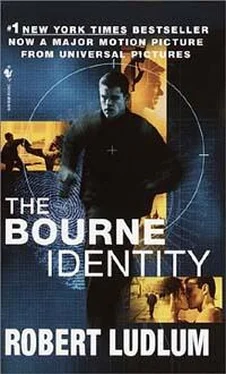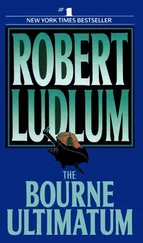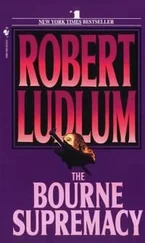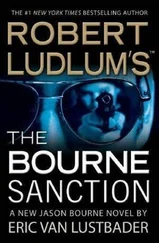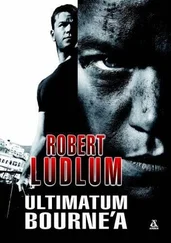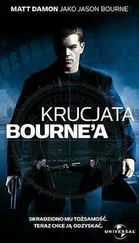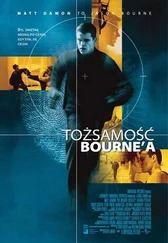You said, ‘What you heard makes no more sense to me than it does to you. Perhaps less …’ I thought you were insane.”
“What I’ve got is a form of insanity. A sane person remembers. I don’t.”
“Why didn’t you tell me Chernak tried to kill you?”
“There wasn’t time and I didn’t think it mattered.”
“It didn’t at that moment—to you. It did to me.”
“Why?”
“Because I was holding on to an outside hope that you wouldn’t fire your gun at someone who hadn’t tried to kill you first.”
“But he did. I was wounded.”
“I didn’t know the sequence; you didn’t tell me.”
“I don’t understand.”
Marie lit a cigarette. “It’s hard to explain, but during all the time you kept me hostage, even when you hit me, and dragged me and pressed the gun into my stomach and held it against my head—God knows, I was terrified—but I thought I saw something in your eyes. Call it reluctance. It’s the best I can come up with.”
“It’ll do. What’s your point?”
“I’m not sure. Perhaps, it goes back to something else you said in the booth at the Drei Alpenhäuser. That fat man was coming over and you told me to stay against the wall, cover my face with my hand. ‘For your own good,’ you said. ‘There’s no point in his being able to identify you.’”
“There wasn’t.”
“‘For your own good.’ That’s not the reasoning of a pathological killer. I think I held on to that—for my own sanity, maybe—that and the look in your eyes.”
“I still don’t get the point.”
“The man with the gold-rimmed glasses who convinced me he was the police said you were a brutal killer, who had to be stopped before he killed again. Had it not been for Chernak I wouldn’t have believed him. On either point. The police don’t behave like that; they don’t use guns in dark, crowded places. And you were a man running for your life—are running for your life—but you’re not a killer.”
Bourne held up his hand. “Forgive me, but that strikes me as a judgment based on false gratitude.
You say you have a respect for facts—then look at them. I repeat: you heard what they said—regardless of what you think you saw and feel—you heard the words. Boiled down, envelopes were filled with money and delivered to me to fulfill certain obligations. I’d say those obligations were pretty clear, and I accepted them. I had a numbered account at the Gemeinschaft Bank totaling about five million dollars. Where did I get it? Where does a man like me—with the obvious skills I have—get that kind of money?” Jason stared at the ceiling. The pain was returning, the sense of futility also. “Those are the facts, Dr. St. Jacques. It’s time you left.” Marie rose from the chair and crushed out her cigarette. Then she picked up the gun and walked toward the bed. “You’re very anxious to condemn yourself, aren’t you?”
“I respect facts.”
“Then if what you say is true, I have an obligation, too, don’t I? As a law-abiding member of the social order I must call the Zurich police and tell them where you are.” She raised the gun.
Bourne looked at her. “I thought—”
“Why not?” she broke in. “You’re a condemned man who wants to get it over with, aren’t you?
You lie there talking with such finality—with, if you’ll forgive me, not a little self-pity, expecting to appeal to my … what was it? False gratitude? Well, I think you’d better understand something. I’m not a fool; if I thought for a minute you’re what they say you are, I wouldn’t be here and neither would you. Facts that cannot be documented aren’t facts at all. You don’t have facts, you have conclusions, your own conclusions based on statements made by men you know are garbage.”
“And an unexplained bank account with five million dollars in it. Don’t forget that.”
“How could I? I’m supposed to be a financial whiz. That account may not be explained in ways that you’d like, but there’s a proviso attached that lends a considerable degree of legitimacy to it. It can be inspected—probably invaded—by any certified director of a corporation called something-or-other Seventy-One. That’s hardly an affiliation for a hired killer.”
“The corporation may be named; it isn’t listed.”
“In a telephone book? You are naive. But let’s get back to you. Right now. Shall I really call the police?”
“You know my answer. I can’t stop you, but I don’t want you to.” Marie lowered the gun. “And I won’t. For the same reason you don’t want me to. I don’t believe what they say you are any more than you do.”
“Then what do you believe?”
“I told you, I’m not sure. All I really know is that seven hours ago I was underneath an animal, his mouth all over me, his hands clawing me … and I knew I was going to die. And then a man came back for me—a man who could have kept running—but who came back for me and offered to die in my place. I guess I believe in him.”
“Suppose you’re wrong?”
“Then I’ll have made a terrible mistake.”
“Thank you. Where’s the money?”
“On the bureau. In your passport case and billfold. Also the name of the doctor and the receipt for the room.”
“May I have the passport, please? That’s the Swiss currency.”
“I know.” Marie brought them to him. “I gave the concierge three hundred francs for the room and two hundred for the name of the doctor. The doctor’s services came to four hundred and fifty, to which I added another hundred and fifty for his cooperation. Altogether I paid out eleven hundred francs.”
“You don’t have to give me an accounting,” he said.
“You should know. What are you going to do?”
“Give you money so you can get back to Canada.”
“I mean afterwards.”
“See how I feel later on. Probably pay the concierge to buy me some clothes. Ask him a few questions. I’ll be all right.” He took out a number of large bills and held them out for her.
“That’s over fifty thousand francs.”
“I’ve put you through a great deal.”
Marie St. Jacques looked at the money, then down at the gun in her left hand. “I don’t want your money,” she said, placing the weapon on the bedside table.
“What do you mean?”
She turned and walked back to the armchair, turning again to look at him as she sat down. “I think I want to help you.”
“Now wait a minute—”
“Please,” she interrupted. “Please don’t ask me any questions. Don’t say anything for a while.”
Neither of them knew when it happened, or, in truth, whether it had happened. Or, if it had, to what lengths either would go to preserve it, or deepen it. There was no essential drama, no conflicts to overcome or barriers to surmount. All that was required was communication, by words and looks, and, perhaps as vital as either of these, the frequent accompaniment of quiet laughter.
Their living arrangements in the room at the village inn were as clinical as they might have been in the hospital ward it replaced. During the daylight hours Marie took care of various practical matters such as clothes, meals, maps, and newspapers. On her own she had driven the stolen car ten miles south to the town of Reinach where she had abandoned it, taking a taxi back to Lenzburg.
When she was out Bourne concentrated on rest and mobility. From somewhere in his forgotten past he understood that recovery depended upon both and he applied rigid discipline to both; he had been there before … before Port Noir.
When they were together they talked, at first awkwardly, the thrusts and parries of strangers thrown together and surviving the shock waves of cataclysm. They tried to insert normalcy where none could exist, but it was easier when they both accepted the essential abnormality: there was nothing to say not related to what had happened. And if there was, it would begin to appear only during those moments when the probing of what-had-happened was temporarily exhausted, the silences springboards to relief, to other words and thoughts.
Читать дальше
